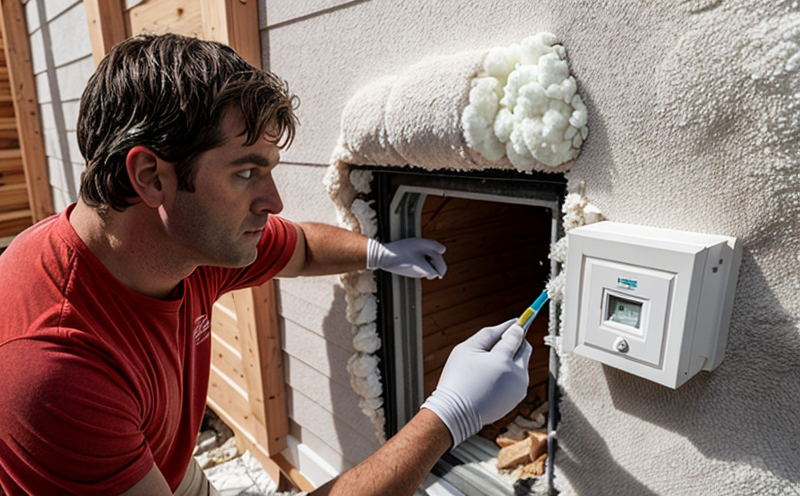EN 13162 Insulation Performance Evaluation
The European Standard EN 13162 is an essential document for assessing the insulation performance of building and construction products. This standard provides a comprehensive framework for evaluating the thermal resistance, thermal conductivity, and other key properties that define the insulative behavior of materials under various conditions. The primary objective of this service is to ensure that construction projects meet the required standards for energy efficiency and safety.
EN 13162 covers a wide range of insulation products used in buildings, including but not limited to mineral wool, glass wool, expanded polystyrene boards (EPS), extruded polystyrene boards (XPS), phenolic foams, and other similar materials. The standard is particularly relevant for sectors such as residential construction, commercial buildings, industrial facilities, and public infrastructure projects.
The testing procedures outlined in EN 13162 are designed to simulate real-world conditions under which insulation products will be used. This includes evaluating the thermal performance of samples at various thicknesses, measuring their resistance to heat flow (R-value), and assessing their ability to maintain insulative properties over time.
For accurate testing, specimens must be prepared according to specific guidelines provided in the standard. This involves cutting samples into standardized sizes and shapes, ensuring they are free from defects or impurities that could affect test results. The materials used for preparation should also comply with EN 13162 requirements.
The equipment required for testing insulation performance includes calorimeters, heat flow meters, and other precision instruments capable of measuring thermal resistance accurately. These devices ensure consistent and reliable data collection during tests conducted according to the specified procedures in EN 13162.
Once collected, test results are analyzed using statistical methods appropriate for interpreting variations within acceptable limits defined by international standards like ISO or EN. Compliance with these criteria ensures that manufacturers can confidently claim their products meet necessary performance levels while also helping architects and builders select suitable materials based on reliable data.
In addition to laboratory testing, field measurements may sometimes be necessary to verify the actual performance of installed insulation systems in buildings. Field tests involve placing sensors directly within walls or roofs where insulating materials have been applied. By comparing lab results with field observations, discrepancies between theoretical expectations and practical outcomes can be identified early on.
Understanding how different factors influence thermal performance is crucial for optimizing designs that balance cost efficiency with environmental sustainability goals. Factors such as air movement through gaps around insulation, moisture content affecting its effectiveness over time, or changes in external temperature all play significant roles in determining overall energy savings achieved by employing effective insulating solutions.
Insulation plays a vital role not only in reducing heating and cooling costs but also in contributing positively to global efforts aimed at mitigating climate change impacts. By adhering to strict testing protocols specified within EN 13162, stakeholders involved throughout the entire supply chain—from raw material suppliers to end users—can contribute towards creating more sustainable built environments.
Industry Applications
- Residential Construction: Ensuring proper insulation levels in homes helps reduce heating and cooling expenses while improving comfort inside living spaces.
- Commercial Buildings: Properly insulating commercial structures ensures consistent temperatures year-round, leading to lower operational costs for owners and tenants alike.
- Industrial Facilities: Insulation is essential for maintaining optimal operating conditions within factories and warehouses; it reduces energy consumption without compromising product quality or safety standards.
- Public Infrastructure Projects: From bridges to tunnels, proper insulation contributes significantly to the durability and longevity of infrastructure assets by minimizing damage due to weather exposure.
The importance of accurate EN 13162 compliance cannot be overstated given its direct implications on energy efficiency, occupant comfort, operational costs, and long-term asset reliability across various sectors. Proper implementation of this standard ensures that all parties involved—from design engineers to facility managers—are working towards common objectives aligned with best practices in the industry.
Customer Impact and Satisfaction
The accurate evaluation of insulation performance using EN 13162 helps ensure satisfaction among customers by providing them with reliable data about their building materials' capabilities. When suppliers provide test results compliant with this standard, architects and builders can make informed decisions confidently knowing they are selecting products that meet specified performance criteria.
For end users like homeowners or business owners, understanding the thermal efficiency of their buildings contributes directly to reducing utility bills, enhancing indoor air quality, and creating healthier living or working environments. Moreover, compliance with regulatory requirements such as those set out by EN 13162 can help avoid potential legal disputes over non-conformance issues down the line.
By offering comprehensive testing services based on this international standard, our laboratory aims to deliver peace of mind to all stakeholders involved in construction projects. Our expertise ensures that every aspect influencing thermal performance is accounted for during evaluation, leading to better-informed decision-making processes and ultimately satisfied customers across diverse sectors.
Competitive Advantage and Market Impact
- Meeting Regulatory Requirements: Adherence to EN 13162 helps companies stay compliant with local regulations, which is crucial for maintaining market access and avoiding penalties.
- Promoting Sustainable Practices: By focusing on energy efficiency through proper insulation evaluation, businesses demonstrate their commitment to green initiatives, appealing to environmentally conscious consumers and stakeholders alike.
- Enhancing Product Reputation: Providing accurate test results based on this standard enhances the reputation of manufacturers and suppliers, fostering trust among clients who value transparency in product quality assurance processes.
- Competitive Edge: Offering advanced testing capabilities aligned with global standards positions companies ahead of competitors offering less rigorous evaluation methods or outdated practices.
The demand for sustainable construction materials continues to grow globally as more emphasis is placed on reducing carbon footprints and promoting energy-efficient buildings. Our laboratory's ability to provide accurate EN 13162-compliant testing services gives us a strong competitive edge in this rapidly evolving market landscape.





